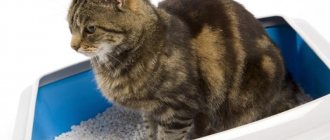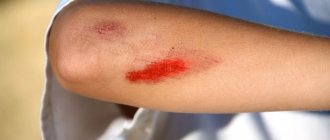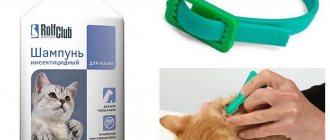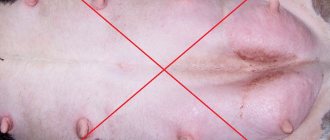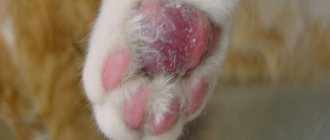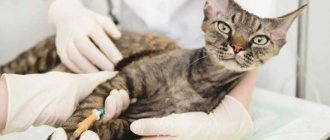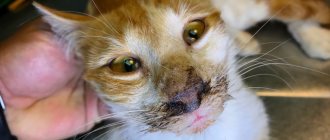Infectious disease of the upper respiratory tract. caused by a DNA herpes virus is called viral rhinotracheitis.
Herpesvirus infection in cats is a fairly common disease, characterized by damage to the mucous membrane lining the respiratory tract, discharge from the nasal cavity, inflammation of the trachea and bronchial tree. In advanced cases and with weak immunity in a cat, viral rhinotracheitis provokes pneumonia, as well as serious eye damage.
Any cat can become infected, regardless of age or breed. But herpesvirus infections are more common in kittens. When cats are kept in crowded conditions, the rhinotracheitis virus spreads quickly, affecting a large number of animals. This is especially noteworthy for nurseries.
What is herpes virus infection
The cause of herpes in cats is the FHV-1 virus. Its second name is rhinotracheitis. It can be infectious, herpesvirus and viral; has acute and chronic forms. To prevent infection, cats are vaccinated. Among unvaccinated animals, the mortality rate ranges from 5 to 20 percent. Methods of infection:
- airborne (being and contact with an infected animal);
- contact (using the same trays and bowls);
- sexual;
- through feces.
The virus can be contained in food, water, milk, urine, secretions from the eyes, nose and genitals. It can also be brought by a person who has been in contact with an infected animal.
If a cat is a latent carrier of the virus, it can be activated due to any factors that reduce immunity, such as stress, pregnancy, illness. Also, its activity depends on the quality of care and nutrition, frequent hypothermia, and overcrowding of pets.
Herpes affects the mucous membranes
The danger of infection is aggravated by the fact that the virus can exist for a long time without a carrier. According to some experts, this period can reach up to two months. Not everyone will agree with this point of view, but the fact that feline herpes remains viable for 4 days is a proven fact. Thus, if a sick animal sneezed or went to the litter box in a room with poor ventilation, there is a high probability that within three to four days a healthy cat will become infected in the same place. Infection occurs more often in the cold season, when the immune system is weakened.
What is a herpes virus, how does it get into the cat's body?
Herpesvirus FHV-1 (Feline Herpes Virus type 1) is the causative agent of herpesvirus infection, or viral rhinotracheitis. It is a DNA virus of the herpesviridae family. It is characterized by rapid proliferation in cell cultures and cell destruction, as well as the ability to establish latent infection in sensory nerve ganglia after primary infection.
Symptoms of the disease
They do not appear immediately. The duration of the incubation period is 3-8 days. Then the first signs of the disease appear:
- decreased or complete lack of appetite;
- lethargy;
- disturbances of the gastrointestinal tract in the form of diarrhea or vomiting;
- shortness of breath;
- mouth ulcers;
- conjunctivitis;
- increase in body temperature.
Advanced infection brings suffering to the animal
Types of disease progression
In the acute course of the disease, a high temperature (up to 40 degrees) lasts for 5 days. After this, inflammation of the eyes, runny nose, and sore throat appear. The cat begins to cough and wheeze. Young and healthy animals with strong immunity, subject to adequate treatment, recover in 7-10 days. As a rule, weakened cats who die develop a secondary infection that leads to pulmonary edema.
If the disease becomes chronic, the process can drag on for years. As a result, your pet may develop ulcerative colitis and blindness. The chronic course of the disease is accompanied by disruption of the central nervous system: the cat’s paws tremble, and he begins to walk in circles. Herpesvirus dermatitis may also occur, resulting in sores on the skin, most often around the mouth and nose. Crusting, swelling and erythema form on the affected areas. The appearance of these symptoms occurs after the main ones have passed.
SAMSUNG
Diagnosis
As soon as the first signs of illness appear, the cat should be immediately taken to a veterinary clinic. Herpes rhinotracheitis has symptoms similar to calcivirus, which also affects the upper respiratory tract. To clarify the diagnosis, the clinic does a blood test. Also, the veterinarian, in conversation with the owner, collects the necessary data, conducts a visual and tactile examination, and takes scrapings of the mucous membranes of the throat, nose and eyes. In addition to calcivirus, it is also necessary to exclude infection with bordetellosis and chlamydia, which have similar symptoms.
Diagnosis of herpes
Unfortunately, you cannot diagnose your pet on your own. He must be examined by a veterinarian, who will take tests, conduct a survey and, based on the data obtained, give a conclusion about the disease.
Only a specialist can determine the diagnosis and draw up a treatment plan for herpes.
Particular attention is paid to the symptoms and appearance of the animal. During a clinical examination, the doctor examines the animal’s mucous membranes and checks its reactions to exposure to individual areas of the body. In order to confirm the diagnosis, you need to take mucous secretions for analysis. Sometimes a descriptive blood test may be needed.
To identify the disease, the doctor takes the pet’s mucous secretions for analysis.
We will get acquainted further with the stages that the owner and his pet will have to go through during the examination.
Table. List of diagnostic procedures
| Manipulation | Description |
| Anamnesis | The doctor collects information about how the disease develops based on the story of the animal owner |
| Inspection | Using an external examination, the doctor checks for the presence of an ulcer, as well as accompanying symptoms. |
| PCR | Test to identify viral DNA |
| Antibody test | An immunofluorescence test is done to detect the presence of antibodies in the body |
| Scraping discharge from throat, nose, eyes | The presence of the virus is detected from mucosal samples |
| Blood analysis | Taken on an empty stomach from the vein of an animal |
If there is a latent form, without acute symptoms, then it is almost impossible to diagnose the presence of herpes. Therefore, cat owners should only contact a veterinarian if there are obvious signs.
Before herpes becomes obvious, it is very difficult to detect it
Differential diagnosis
Unfortunately, inexperienced veterinarians can often confuse rhinotracheitis with other diseases. The most common of them is calcivirosis. The symptoms of these diseases are similar. However, different pathologies require different treatments. Calcivirosis is a disease that, like rhinotracheitis, affects the upper parts of the respiratory system. It occurs due to the lack of vaccination against calcivirus. The only way to determine what disease has affected your cat is through a blood test.
Only an animal blood test will allow an accurate diagnosis to be made.
Treatment of feline herpesvirus infection
You can treat your pet only when the disease takes an acute form, since exacerbation of symptoms allows you to choose the optimal treatment option. The sooner the cat gets to the veterinarian, the less likely complications will arise. Self-medication in this case is unacceptable.
Cats often develop conjunctivitis
Drug therapy
To protect the mucous membrane and relieve inflammation, anti-inflammatory ointments are prescribed - acyclovir or tetracycline. The course of treatment lasts a week, the ointment must be applied to the lower eyelid 3-5 times a day. Tablets are prescribed only for very severe forms of the disease due to their toxic effects on the liver.
To treat the upper respiratory tract, antibacterial drugs are used - telazine, tetracycline and others. Treatment of herpes in cats can be supplemented with immunomodulators, antihistamines, vitamins B and C. The list of drugs may include antibiotics that suppress pathogenic microflora and prevent consequences. When prescribing these drugs, it is necessary to take medications that support the liver, kidneys and heart. Your doctor may also recommend taking sedatives.
During the treatment process, the affected areas need to be treated. They are wiped with cotton pads soaked in Miramistin or Chlorhexidine and potassium permanganate. Treatment is carried out 3-5 times daily until symptoms disappear.
Treatment must be prescribed by a veterinarian
Traditional methods of treating herpes in cats
They are used as an addition to drug treatment prescribed by a veterinarian. It is important to remember that some home remedies can be harmful to cats. Any vodka and alcohol tinctures, decoctions and infusions that contain aloe are strictly prohibited. It is best to use a decoction or infusion of calendula and chamomile. This product can be used to wipe the inflamed areas and give the cat water.
Washing mucous areas
Washing the affected mucous membranes is a mandatory procedure for an infected cat. For rinsing, it is recommended to use various solutions and decoctions listed above. Potassium permanganate, calendula decoction, even boiled water are perfect for this procedure.
Cats rarely tolerate instillation of drops calmly
You need to choose, after consulting with your doctor, exactly the solution that your pet currently needs. Most likely, the cat will resist such a procedure, because it gives her pain and discomfort. Therefore, if the cat is in a fairly active state, we recommend wrapping it in a towel or diaper, like a child. Place the animal on your lap, securing it with your left hand.
An example of proper swaddling of a cat
Meanwhile, take a clean cotton pad and soak it in the solution. Squeeze the disc slightly to prevent large drops from dripping off it. Using gentle, blotting movements, wipe the affected areas and the area around them. The procedure can be carried out several times in a row. After this, wait a few seconds for the solution to absorb a little. You can let the cat go. In order to achieve the effect, it is recommended to carry out this procedure at least 3 times a day.
We'll talk about how to securely wrap a cat in a towel, avoiding encounters with your pet's sharp claws and teeth.
Wrap the cat in a towel
A sick animal must wash the affected mucous areas. A decoction of calendula or another solution prescribed by a veterinarian is perfect for this procedure. Cats do not like this procedure very much, so you can wrap your pet in a diaper or towel, like a small child, and then place him on your lap and hold him with your left hand.
Next, you need to take a sterile cotton pad and soak it in the decoction or solution. You should squeeze the disc a little so that liquid does not drain from it. It is necessary to gently wipe the affected areas and the areas around them. You can do this several times in a row. Then you should wait a few seconds for the broth to be absorbed and release the animal. It is recommended to carry out this procedure at least 3 times a day.
Forecasts
Forecasts are usually positive. If the animal is treated promptly in accordance with the veterinarian's recommendations, there will be no threat to life. Only weakened or untreated pets die.
After the cat has recovered, it will be a carrier of the herpes virus for about three months. Its cells are found in urine, saliva, mucous membranes of the eyes and nose. This disease cannot be completely cured. Herpesvirus in cats goes into a latent form and remains in the body. Repeated exacerbation occurs under the influence of various stress factors.
One of the complications is blindness or scarring of the eyes
Preventive measures
There are a number of rules that, if followed, will help avoid relapse. Animal owners often forget that cats need to be vaccinated against various diseases, including the herpes virus. The pet must have a passport containing information about the vaccinations received. If the owner does not yet have such a booklet, he should buy one and then vaccinate.
To protect a cat from rhinotracheitis, it is necessary to use a polyvalent vaccine, for example, “Corifelin” or “Quadricat”. These drugs are contained in ampoules and are administered intravenously to animals. Even if after vaccination your pet suddenly gets sick with rhinotracheitis, it will become much easier to cure, the symptoms of the pathology will not be pronounced.
Don't underestimate the importance of hygiene. You should always thoroughly wash your pet's toys, bedding and bowls, and when cleaning the house, use products containing chlorine. Being in a clean apartment significantly reduces the likelihood of infection entering the cat’s body.
Herpes is not only an unpleasant, but also a very dangerous disease. The virus cannot be completely eliminated, but you can get rid of its manifestations and avoid serious complications. It is necessary to carefully monitor the animal’s health, diagnose the pathology in a timely manner and adhere to the treatment plan prescribed by the veterinarian.
Possible complications
If your cat is not treated, he may develop pneumonia, scars on his eyes, dry eye syndrome, and the animal may even go blind. The herpes virus often affects the lower lip and nose; ulcers and tissue necrosis may appear in these places. In some cases, the jawbone is destroyed. Rhinitis and conjunctivitis become chronic.
No more than 20% of cats die from herpesvirus. Kittens and adults with weak immune systems often develop pneumonia and die. If the disease develops in a pregnant cat, there is a high chance that a sick or dead kitten will be born.
In advanced cases, pneumonia may develop
Vaccination
The vaccine against herpes virus infection is considered the main method of prevention.
Additional preventive measures include:
- creating living conditions in which the cat will not experience stress. You cannot raise your voice at an animal. There should be no violent quarrels and disputes in the family. It is better to travel to the veterinary clinic by car or call a specialist at home;
- if the owner walks his pet on the street, contact with other animals should be limited as much as possible;
- before mating, the future partner must be tested for the presence of the virus;
- if a sick animal appears in the house, it must be isolated so that healthy animals do not become infected;
- the cat should be examined regularly by a veterinarian;
- it is necessary to follow a proper diet;
- If your furry friend “sits” mainly on a natural diet, you need to consult a veterinarian so that your pet can be prescribed a vitamin and mineral complex.
Even if the cat has been vaccinated, there is no guarantee that he will not become infected with a herpes virus infection in the nursery or in other places where he communicates with his fellow cats. In this case, it will not show any symptoms, but the animal will still be a carrier of the virus. However, a vaccinated animal is spared from severe complications of this disease. Also, the vaccine will not protect a cat that is already a carrier of the virus, but the risk of spreading it to other animals will be much lower.
It is important to follow all necessary preventive measures
Precautionary measures
There are certain rules that allow animals to avoid herpes. Very often, owners forget that the cat must be vaccinated against a number of diseases, including herpes. The animal must have a special passport, where data on vaccinations performed is entered annually. If you still don’t have such a book, be sure to buy it, regularly vaccinate your pet and visit a veterinarian twice a year.
It is important not only to get useful vaccinations, but also to keep records of them
In order to protect the animal from the development of rhinotracheitis, it is necessary to use polyvalent vaccines. These include the following drugs:
- "Corifelin."
- "Multifec."
- "Quadricate".
The drugs are stored in ampoules and administered intravenously to cats.
Even if after the vaccine the animal gets sick with rhinotracheitis for some reason, it will go away easier, in the absence of severe symptoms.
Don’t forget about disinfecting objects that a sick animal has interacted with:
- carefully handle cages, bowls, toys;
- use disinfectants and chlorine-containing compounds when washing the floor and cleaning the apartment;
A clean home will significantly reduce the risk of infection entering your pet’s body.
- if your house contains several animals that have had rhinotracheitis, then give preference to separate living for a while;
- When walking, limit your pet’s contact with other animals if possible.
Recommendations for caring for a sick animal
Once the veterinarian has confirmed the diagnosis, the cat should be placed in a warm room, making sure that there are no drafts in the room. She needs special nutrition during treatment. If your pet has no appetite, you can stimulate it using any strong-smelling products.
A sick cat must be isolated from other pets. To make it easier for her to breathe and also to clear her stuffy nose, it is recommended to do inhalations or periodically keep the animal in a steamed bathroom for a while (to do this, turn on the hot water and close the door tightly).
The tray and bowls for food and water should always be clean. The cat needs to periodically rinse its nose, as accumulated mucus makes breathing difficult.
To destroy the virus in the premises, all surfaces are wiped with a disinfectant solution. To do this, mix bleach and water in a ratio of 1:32 (to one part bleach, 32 parts water). Objects and surfaces that should not be exposed to chlorine solution can be treated with soapy water. There are special disinfectants for treating upholstered furniture.
Diet
If the cat has been fed only dry food all the time, for the period of treatment it is better to switch it to wet food from the same manufacturer or select a special line of food rich in vitamins and minerals. This will help restore immunity faster. If a furry patient has a natural diet, his menu should be supplemented with the following dishes:
- liquid soup;
- porridge;
- meat puree (chicken and beef);
- pate processed with boiling water;
- boiled fish;
- vegetable puree.
Such nutrition will replenish the body with essential vitamins.
It is necessary to change the water two to three times a day; it must be bottled or filtered. Tap water should not be given. Until the animal recovers, you should not give it cat treats from pet stores. Eliminate food from the host’s table completely, this will only harm your health.
The key to a cat’s health is a timely visit to the veterinarian
